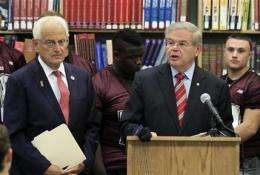Lawmakers: CDC to have student concussion protocol

(AP) -- As awareness continues to grow about sports-related concussions among student athletes, two New Jersey lawmakers say it's time for schools to start following nationwide protocols governing such injuries.
U.S. Sen. Robert Menendez and Rep. Bill Pascrell announced Tuesday that the Centers for Disease Control and Prevention agreed to study and develop national guidelines for managing sports-related concussions for student athletes.
Menendez and Pascrell, both New Jersey Democrats, had sponsored legislation, which passed the House but stalled in the Senate, that would have made such protocols mandatory. Several states, including New Jersey, have laws requiring a physician's approval for a student to return to sports, but Pascrell said there needs to be nationwide guidance for schools and youth sports programs to follow.
"The science may be changing, but that's no excuse for not establishing a protocol," Pascrell said, referring to differing scientific findings on concussions. "We're close to that for our soldiers, we need to be even closer for our children."
Stressing that "every concussion is brain damage," Pascrell said 41 percent of student athletes who suffer concussions return to playing too soon, sometimes with serious or even fatal consequences.
The CDC will convene a panel of experts to define the scope of the protocol, review existing literature, review the current state of science on concussions and have protocols ready for distribution by fall of 2014, according to Pascrell.
"Sports are a great way for kids and teens to stay healthy and this project will help us continue the important work in traumatic brain injuries in sports and other activities," said Dr. Linda C. Degutis of CDC's National Center for Injury Prevention and Control. "CDC's new initiative on pediatric guidelines will work to improve diagnosis and management of brain injuries in younger children and teens who are injured on or off the playing field."
About a dozen states, including New Jersey, have rules related to concussions and brain injuries among student athletes, according to the National Conference of State Legislatures. Other states are considering similar measures.
Concussions are caused by a blow that forces the head to move violently. They can affect memory, judgment, reflexes, speech, balance and muscle coordination and the symptoms become worse if not properly treated. Young people, particularly girls, are more susceptible to long-term repercussions than adults.
Pascrell started pushing for legislation after the October 2008 death of Montclair High school football player Ryne Dougherty. Dougherty reportedly sat out three weeks after suffering a concussion but was cleared to return to playing after taking a test. He collapsed after making a tackle his first game back, and died after suffering a brain hemorrhage.
For years, the CDC has been working on the issue of sports-related concussions, and developed materials for coaches on steps to take if they think a student athlete suffered a concussion. Those steps include removing the athlete from the game or practice, and then having them evaluated by a health care professional with experience in concussions. The advice also suggests not returning the athlete to play until the health professional says it's OK, and telling the student's parents what happened.
But Tuesday's announcement represents something broader. The CDC is putting together an expert panel to discuss possible pediatric guidelines for doctors on how to best diagnose and treat concussions that occur not only on the sports field but also from car accidents, falls and other causes. That might include a look at the type of assessments currently used, although exactly what the panel will examine hasn't been decided.
The announcement was held at Nutley High School in New Jersey, where athletes say the school has adopted a strict policy in recent years on monitoring concussions.
Seventeen-year-old Andre Hamlin has been playing football since he was in the third grade. Now a senior on the football team, he said he's noticed a major change in recent years, with coaches making awareness and testing for concussions mandatory.
Hamlin said all student athletes take a computerized "impact test" of word problems and other questions that test brain function and must be cleared by a doctor before starting any sport.
He said awareness of concussions is now common and that coaches tell players how to avoid concussions by keeping their heads up during football plays.
"It's something that's present throughout the season, our coach emphasizes it," Hamlin said. "If you see a player put their head down incorrectly it kind of gets your skin crawling, `cause that's how you can get a concussion. We tell the younger kids: put your head up, and stay safe out there."
©2011 The Associated Press. All rights reserved. This material may not be published, broadcast, rewritten or redistributed.

















